The Trust is deeply saddened to learn of the death last Saturday of composer Hugh Wood.
Hugh was a close friend of both Hans Keller and Milein Cosman and has been a Patron of the Trust since its foundation.
The Trust is deeply saddened to learn of the death last Saturday of composer Hugh Wood.
Hugh was a close friend of both Hans Keller and Milein Cosman and has been a Patron of the Trust since its foundation.
The winner of the inaugural Milein Cosman Scholarship for Drawing at the Slade School of Fine Art is Hannah Uzor.
Hannah’s art focusses on portraiture and draws deeply on historical research and her love of storytelling, as she explores the complexities of the Black identity and experience: read more here.
The Trust is delighted to announce that from September 2021 it will be supporting the Chamber Fellowships at the Guildhall School of Music & Drama, in memory in Hans Keller, who taught at the Guildhall in the 1980s.
The inaugural Hans Keller Chamber Fellows in 2021 will be the Consone Quartet and the Mithras Trio: read more here.
The string quartet was of particular importance to Hans Keller. In 2021 the Trust is embarking on a three-year project in support of string quartets, working with a variety of expert partners.
As part of this, the Trust is delighted to announce a new partnership with the Young Classical Artists Trust to support the Adelphi Quartet: read more here.
The Trust announces with great sadness the death of David Scrase, Cosman Keller Trustee since 2016. David joined us after his retirement from the Fitzwilliam Museum in Cambridge, where he was for many years Keeper of Paintings, Drawings and Prints and then Assistant Director of Collections, amassing an unsurpassed knowledge of the collections and directing a remarkable period of acquisitions for the museum.
We are grateful for his deep understanding of drawing and profound knowledge of the history and making of art — and to have had the wonderful company of such a generous, charming and witty friend and colleague.
Keller was famous for his illustrated public lectures on music, and this volume publishes for the first time the full text of his celebrated 1973 series on Beethoven’s Op.130.
Keller gave these lectures at the invitation of Alexander Goehr, and they were illustrated live by the Aeolian Quartet and broadcast by the BBC. They were in part a response to Joseph Kerman’s newly published monograph on The Beethoven Quartets, and in part a demonstration of his “two-dimensional theory” of music, which posits a vital tension between “well-defined expectations” and ‘”what the composer does instead”. These lectures have now been transcribed, and appear in print here for the first time: they form Keller’s most substantial examination of a single chamber work. Keller had intended a full-length monograph on the quartet, but never got further than three chapters, of which the second, on “String-quartet Playing”, is included here along with related materials. The book comes with a supplementary volume of music examples, including the entire score of Op. 130, and is illustrated with lively string-quartet drawings by Keller’s wife, Milein Cosman.
Purchase the BookNews of future events, including Milein Cosman’s Centenary in 2021, will be coming shortly.
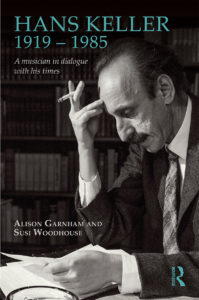
“This is a detailed and revealing biography, rich in context and background, of one of the great musical thinkers, writers and broadcasters of our time. It casts a penetrating light on the post-war cultural scene and the passionate internal battles of music broadcasting on the BBC. Keller’s many enthusiasms, from Schoenberg and Mendelssohn to Gershwin and the Beatles, shine through his fiercely communicative prose. And all are illuminated by the moving personal integrity of a man who, facing extinction by the Nazis in 1938, swore that if he survived “I’ll never again be in a bad mood, whatever the circumstances of my life or death”. Alison Garnham and Susi Woodhouse have written a vital chapter in the musical history of our times.” (Nicholas Kenyon)
Published to mark the 2019 centenary of Keller’s birth, this is the first full biography of Hans Keller and the first appearance in print of many of his letters. Eight substantial chapters, integrating original documents with their historical context, show the development of Keller’s ideas in response to the people and events that provoked them. It was a vital time for music in Britain, fuelled by unprecedented public investment in the arts and education and the rapid development of recording and broadcasting. Keller was at the centre of all that was happening and his far-sighted analysis of the period is deeply resonant today.
Purchase the Book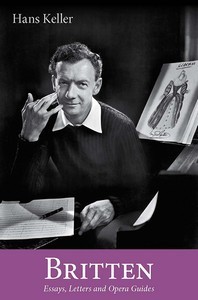 This volume was published for Britten’s centenary in 2013. It contains a large selection of the best of Keller’s writings on Britten, an illustrated study of Keller’s and Britten’s relationship through their correspondence (with their letters reprinted in full for the first time), a reprint of Keller’s long out-of-print handbooks on The Rape of Lucretia and Albert Herring, and an ‘Operatic Sketchbook’ of Milein Cosman’s drawings from life.
This volume was published for Britten’s centenary in 2013. It contains a large selection of the best of Keller’s writings on Britten, an illustrated study of Keller’s and Britten’s relationship through their correspondence (with their letters reprinted in full for the first time), a reprint of Keller’s long out-of-print handbooks on The Rape of Lucretia and Albert Herring, and an ‘Operatic Sketchbook’ of Milein Cosman’s drawings from life.
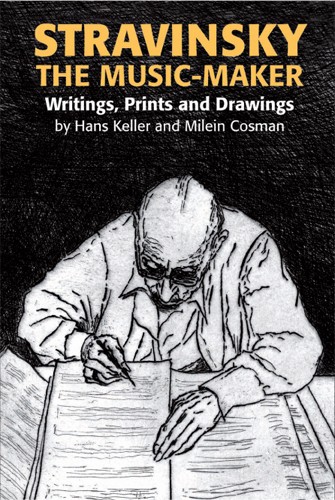 Published in 2010, this book contains Hans Keller’s complete writings on Stravinsky, illustrated with a large selection of Milein Cosman’s drawings and prints of the composer, with a preface by Hugh Wood, setting the Keller-Cosman partnership in the framework of the British musical life they enriched.
Published in 2010, this book contains Hans Keller’s complete writings on Stravinsky, illustrated with a large selection of Milein Cosman’s drawings and prints of the composer, with a preface by Hugh Wood, setting the Keller-Cosman partnership in the framework of the British musical life they enriched.
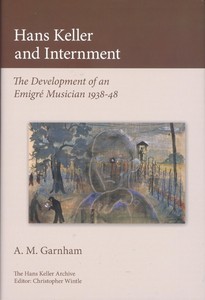 This book examines the effect of exile and internment on the intellectual development of the young Hans Keller, setting his personal story in the context of what is still a too-little-remembered part of British wartime history. It includes several important Keller texts, including that of his famous broadcast describing his escape from Nazi-occupied Vienna, together with his letters from British internment camps, set within the wider story of what was going on outside, where an intense political debate was taking place during Britain’s ‘finest hour’ about the rights of the individual in times of national emergency. The final section of the book shows the profound effect on Keller of his enforced change of language and culture, as he rediscovered his Viennese heritage through the very different culture of 1940s London.
This book examines the effect of exile and internment on the intellectual development of the young Hans Keller, setting his personal story in the context of what is still a too-little-remembered part of British wartime history. It includes several important Keller texts, including that of his famous broadcast describing his escape from Nazi-occupied Vienna, together with his letters from British internment camps, set within the wider story of what was going on outside, where an intense political debate was taking place during Britain’s ‘finest hour’ about the rights of the individual in times of national emergency. The final section of the book shows the profound effect on Keller of his enforced change of language and culture, as he rediscovered his Viennese heritage through the very different culture of 1940s London.
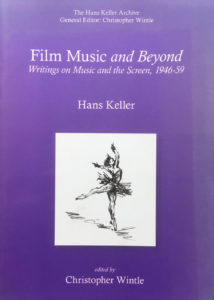 During the 1940s and 1950s, Keller was the most outspoken voice in British film music. He argued passionately for ‘the need for competent film music criticism’, laid out the main topics of the day, and studied the contribution of all the main British composers and many others besides. In particular he championed William Alwyn, Arthur Benjamin and Alan Rawsthorne as well as the more established names of Auric, Bernstein, Britten, Thomson, Vaughan Williams and Walton. In 1959 he also devoted a column to ‘television music’.
During the 1940s and 1950s, Keller was the most outspoken voice in British film music. He argued passionately for ‘the need for competent film music criticism’, laid out the main topics of the day, and studied the contribution of all the main British composers and many others besides. In particular he championed William Alwyn, Arthur Benjamin and Alan Rawsthorne as well as the more established names of Auric, Bernstein, Britten, Thomson, Vaughan Williams and Walton. In 1959 he also devoted a column to ‘television music’.
This volume collects together all Keller’s writings on film music. It forms a vital complement to the contemporary Composing for the Film by Hanns Eisler and Theodor Adorno and provides an invaluable and unparalleled account of a great age for film music. Includes line drawings by Milein Cosman.
Purchase the Book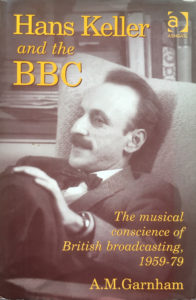
This study of Keller’s BBC work is a vivid portrait of the changing face of British broadcasting seen through the work of one of its most significant personalities.
Drawing on a wealth of primary sources, much of which has never been previously examined, this book paints a striking picture of Keller’s personality in combination with the BBC’s turbulent inner workings, showing the effect of one remarkable individual on the most powerful musical institution in 20th-century Britain.
Purchase the Book
This is the first collection of Hans Keller’s psychoanalytic music criticism – looking at composers, performers, listeners and critics – much of which has never been previously published.
Purchase the Book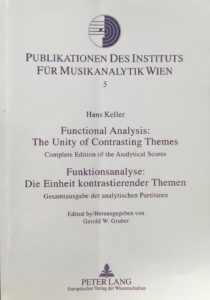 This volume contains the full scores of all Keller’s Analytical Scores, together with introduction and commentary in English and German.
This volume contains the full scores of all Keller’s Analytical Scores, together with introduction and commentary in English and German.
 Hans Keller wrote his Jerusalem Diary in 1977 and 1979 during two visits that he and Milein Cosman made to the Mishkenot Sha’ananim, a residence for writers and artists. This Diary, which he described as an ‘anti-journal’, was initially a reaction to Saul Bellow’s To Jerusalem and Back. But the result is far more than a topical riposte: at a time of renewed turbulence in the Middle East, it is a sharp and insightful record of the artistic, social and political life of Israel at a crucial juncture in its history.
Hans Keller wrote his Jerusalem Diary in 1977 and 1979 during two visits that he and Milein Cosman made to the Mishkenot Sha’ananim, a residence for writers and artists. This Diary, which he described as an ‘anti-journal’, was initially a reaction to Saul Bellow’s To Jerusalem and Back. But the result is far more than a topical riposte: at a time of renewed turbulence in the Middle East, it is a sharp and insightful record of the artistic, social and political life of Israel at a crucial juncture in its history.
Wonderfully illustrated by Milein Cosman’s drawings, this book won the Royal Philharmonic Society’s Book of the Year prize for 2001.
Purchase the Book This is the first large selection of Keller’s essays to be published after his death. The first part of the book addresses psychological issues relating to critics, listeners, players and composers; the second analyses music by a wide range of composers from Haydn to the late twentieth century; and the third propounds Keller’s new theory of music, with essays on unity and contrast, motifs, themes, keys, timbre and rhythm, plus the full score of Keller’s Functional Analysis of Mozart’s piano sonata in A minor. The volume concludes with a magisterial account of what Keller deemed to be ‘the principles of composition’.
This is the first large selection of Keller’s essays to be published after his death. The first part of the book addresses psychological issues relating to critics, listeners, players and composers; the second analyses music by a wide range of composers from Haydn to the late twentieth century; and the third propounds Keller’s new theory of music, with essays on unity and contrast, motifs, themes, keys, timbre and rhythm, plus the full score of Keller’s Functional Analysis of Mozart’s piano sonata in A minor. The volume concludes with a magisterial account of what Keller deemed to be ‘the principles of composition’.
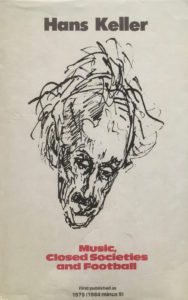 This is a reissue of the book first published by Keller under the title 1975 : 1984 minus 9. It is a passionate defence of individualism, and a reflection on ‘the state of things we’d reached in 1975 in areas of life I know’ – music, politics, psychoanalysis and football.
This is a reissue of the book first published by Keller under the title 1975 : 1984 minus 9. It is a passionate defence of individualism, and a reflection on ‘the state of things we’d reached in 1975 in areas of life I know’ – music, politics, psychoanalysis and football.
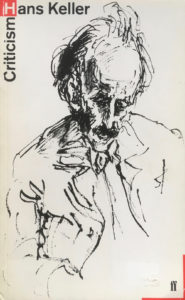 This brilliant and controversial book is Keller’s assault on ‘criticism’ and the ‘phoney professions’ of the music critic, the broadcaster, the musicologist, the conductor, the politician, the psychoanalyst, the teacher and the editor. That Keller himself was active in most of these fields at one time or another was an irony of which he was well aware.
This brilliant and controversial book is Keller’s assault on ‘criticism’ and the ‘phoney professions’ of the music critic, the broadcaster, the musicologist, the conductor, the politician, the psychoanalyst, the teacher and the editor. That Keller himself was active in most of these fields at one time or another was an irony of which he was well aware.
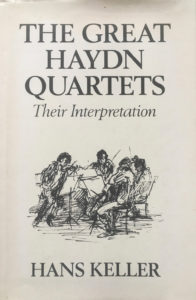 Although many composers have written string quartets, only a few have possessed an intrinsic mastery of the medium. Of these Haydn was the first and, thought Keller, in one definable sense the greatest.
Although many composers have written string quartets, only a few have possessed an intrinsic mastery of the medium. Of these Haydn was the first and, thought Keller, in one definable sense the greatest.
Written primarily from the view of the player, this classic book is a profound and detailed examination of Haydn’s 45 greatest quartets, the fruit of a lifetime’s devotion to these works.